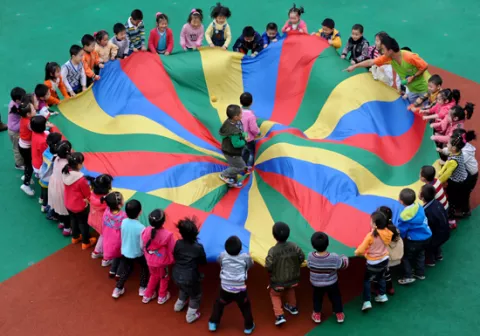China works to ensure a fairer start in life for millions
China works to ensure a fairer start in life for millions
- Available in:
- 中文
- English
21 December, 2010, Beijing – China's state council has issued new policies to make pre-school education more available and affordable to its more than 100 million children under six, about one fifth of the world's total.
This was the first time since the founding of the People's Republic of China that the State Council has issued specific policies to enhance preschool education. Premier Wen Jiabao also visited a kindergarten in Beijing earlier in November, showcasing strong high-level commitment to address public woes over the shortfall in pubic services.
In announcing the new priorities in early December, State Council Member Madame Liu Yandong explained that early childhood education has emerged as new need for education equality. She stated that early childhood education is necessary for building a nation with strong human resources.
The Government of China has committed to increase expenditure for construction of new pre-school facilities, provide support for private centres, improve training and benefits for teachers and leverage educational subsidies to rural areas. It has also pledged to make one-year of pre-school education universal by 2020.
Baby boomers have already felt the pinch of limited access to preschool education, a learning and development opportunity that is highly beneficial for children's emotional health and optimal development. Reportedly some parents have to line up overnight to get their children enrolled in public kindergartens, and the fees for private ones are beyond reach for many families.
The average national enrolment rate for three-year pre-school education was 50.9 percent in 2009. In rural areas, low awareness resulted in two-thirds of children missing out on pre-school, according to research carried out by Beijing Normal University.
China's expenditure on preschool education is about 0.06% of GDP, lower than that of India, Brazil, Mexico and other developing countries. As China's GDP per capita is expected to hit 4,000 U.S. dollars by the year end, the Government has put the equity of social development as its central task, in view of the growing rural-urban and regional differences.
"The highlights in the new policies are that the Government is committed to increase financial inputs and make pre-school education part of the social services to ensure equal opportunities for all children, especially those in rural areas, to get a fairer start in life.” Ms. Chen Xuefeng, Early Childhood Development Specialist with UNICEF China said.
The Government is now piloting rural kindergarten construction projects in ten provinces and districts in mid-western China and plans to expand into additional areas. It also plans to train 10,000 kindergarten managers and key staffers in rural areas within three years. Special funds have been set aside by the Central Government to support preschool in rural, and frontier areas with large minority populations. Local governments are asked to include preschool education in their fiscal budgets.
UNICEF's pilot programmes on early childhood development and advocacy for improved policies were part of the driving forces that finally led to the new national programmes.
In the past decade, UNICEF has been working with the Ministry of Education to pilot early childhood development programmes in 29 counties of ten provinces, mostly in the lesser-developed rural areas with large ethnic minority populations.
"We mobilised county governors and educational departments to commit more financial investment for preschool education, introduced Child Friendly approaches in rural kindergartens to improve quality, and we disseminated child rearing and child care knowledge to parents and communities.” Chen said.
In early December, at a national conference call on the implementation of the new policies, Mr. Luo Wenxiang, governor of De'e Township in Longlin County of Guangxi Province from one of the UNICEF-supported pilot programme sites, shared the practices of promoting pre-school education at the village level. He was one of the major speakers to present good examples to all the educational staff across the country.
Best practices and evidence gained from the pilot areas served as important reference points for national policy development and analysis. In 2010, the average enrolment rate in UNICEF project counties reached 75.5%, nearly 25 % higher than the national average, and local fiscal expenditure earmarked for preschool education has increased by 2.5 times over the last five years.
UNICEF and the Ministry of Education have jointly developed the “Early Learning and Development Guidelines for Children Aged from 3 to 6”, which is expected to set national standards on preschool education quality. Results and policy suggestions from UNICEF-supported researches have also been submitted to the National People's Congress for legislative reference.


